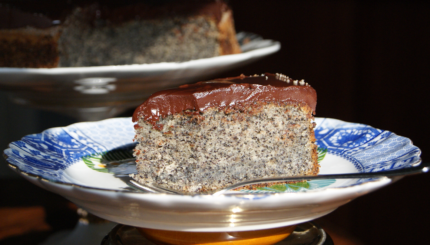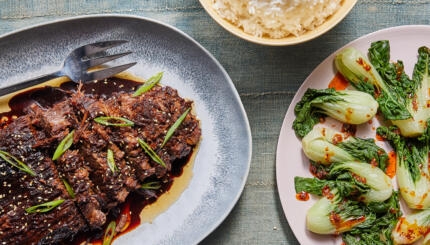When I was in high school, I was dating a lovely (non-Jewish) guy whose parents seemed vaguely confused by my Jewish heritage and always had a slew of questions about Jews. In fact, one time the boyfriend’s sister asked me, “So, what do Jews eat on Thanksgiving?” I was a bit bewildered by her question. I responded, “Um, turkey…”
Thanksgiving is one of my favorite holidays for so many reasons: I love the Autumn-infused food choices, foliage inspired tablescapes, and of course, is there anything better than stuffing?
But is it appropriate to deviate from American classics and infuse some Jewrific food choices into the menu? I imagine many of you already do just this.
During a brief stint working for a law firm in Washington, DC I worked alongside a lovely woman whose family was Filipino. Thanksgiving was right around the corner during the time that we worked 15 hour days together, and so I got to learn a lot about her and her family. One of the most interesting tidbits she shared was that her family never celebrated Thanksgiving with turkey, but rather, with a roast pig, as was a traditional Filipino custom. So interesting! I also know plenty of Italian American families who serve lasagna and meatballs right alongside their turkey and stuffing each year. And in truth, what better way to celebrate this holiday of giving thanks and celebrating an immigrants’ experience than bringing in different cultural culinary traditions into the meal.
The Nosher celebrates the traditions and recipes that have brought Jews together for centuries. Donate today to keep The Nosher's stories and recipes accessible to all.
My own favorite Thanksgiving recipes include this fantastic, moist and already pareve (non-dairy) recipe for Sweet Potato Cake (you can ignore the icing or not). I also love Tyler Florence’s recipe for Whipped Sweet Potatoes with Bananas and Honey, perhaps as an alternative to the “traditional” sweet potatoes with marshmallows on top. You can also try trading in your white bread for leftover challah in your stuffing.
And for a truly Jewey Thanksgiving side dish, I recommend the tried and true Butternut Squash Kugel. This recipe was given to my mother-in-law, by her mother-in-law. I only hope one day I can push recipes upon my daughter-in-laws in the same way (I jest, I jest).
From The Melting Pot, a cookbook put out in the early 1980s by the Hebrew Academy of Long Beach Women’s League.
Ingredients
2 10 ounce bags of frozen butternut squash (defrosted)
1 stick of melted margarine
1 cup of sugar
1 cup of flour
3 eggs
1 cup of pareve milk
cinnamon
Directions
Mix all ingredients together in Kitchen Aid, or with electric mixer until blended and smooth.
Grease 9x9 pan (or 9x13 for thinner kugel). Sprinkle top with cinnamon
Cook at 350 until firm (approximately 45 minutes to 1 hour).
challah
Pronounced: KHAH-luh, Origin: Hebrew, ceremonial bread eaten on Shabbat and Jewish holidays.
pareve
Pronounced: PAHRV or pah-REV, Origin: Hebrew, an adjective to describe a food or dish that is neither meat nor dairy. (Kosher laws prohibit serving meat and dairy together.)


